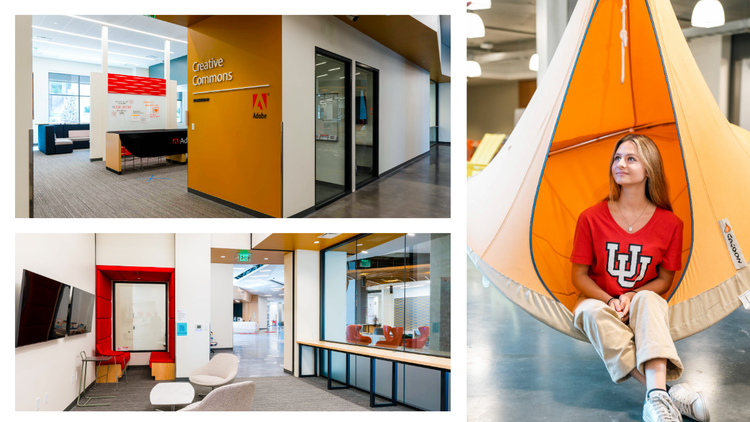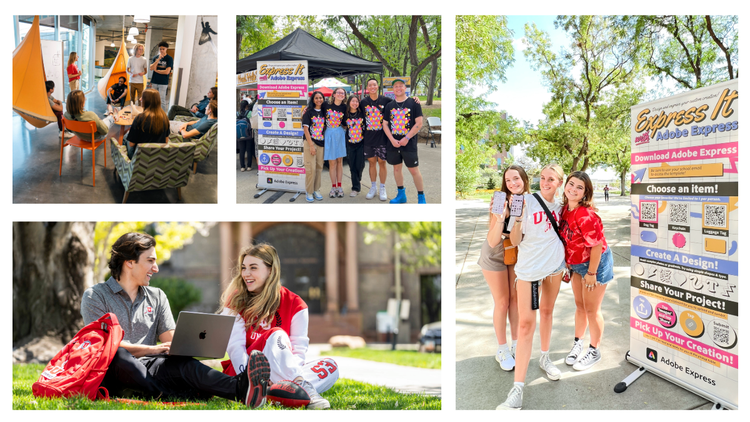Where creativity meets impact: Utah named Adobe Creative Campus Innovator

At the University of Utah, innovation doesn’t sit in a lab. It lives in classrooms, studios, and community spaces where creativity is put into action. Whether students are planning podcasts, launching social campaigns, or rethinking how nonprofits reach their audiences, they’re doing it with a toolkit built on digital fluency and bold ideas.
This culture of hands-on innovation is just one reason the University of Utah has been named an Adobe Creative Campus Innovator — one of a select few institutions to receive this new recognition. The designation honors colleges and universities that actively lead with creativity, embed it across disciplines, and use it to transform teaching and learning.
It’s a fitting honor for a campus where digital storytelling is not just encouraged — it’s expected.

Advancing digital literacy with microcredentials
A cornerstone of Utah’s creative momentum is its use of Adobe microcredentials, which are short, self-paced learning experiences that equip students with job-ready communication and digital skills. Each course focuses on a specific topic — such as creating eye-catching social media content or producing podcasts — and integrates Adobe tools, including responsibly deployed generative AI.
Upon completion, students receive digital certificates and LinkedIn badges to showcase their skills to potential employers, giving them a clear edge in today’s digital workforce.
“Being an Adobe Creative Campus Innovator reflects our broader commitment to creativity and innovation in teaching and learning. We’re constantly looking for new ways to go deeper to create meaningful opportunities for students to develop real skills that matter in their careers. Microcredentials are one way we’re doing that, but they’re part of a much bigger movement here.”
-Holly Johnson, Associate Director of Learning Experience Innovation & Outreach
Growing a nonprofit audience for Tech-Moms
The University of Utah’s David Eccles School of Business puts this ethos into action with its annual Social Impact Challenge. Students team up to create websites, social media posts, and other digital storytelling elements to solve challenges for real-world nonprofit organizations.
This year, participants worked with Tech-Moms, a Utah-based nonprofit empowering working mothers to gain the technical skills they need to advance their careers and enter technical fields. Students were required to complete at least one microcredential before developing their campaigns using Adobe Express, ensuring they had a baseline of creative literacy. In total, participants completed 73 microcredentials.
A team of standout first-year MBA students — Camilla Kenning, Fernanda McManus, and Benjamin Nightingale — designed a winning project aimed at growing Tech-Moms’ membership through existing community networks. Each team member selected microcredentials tailored to their project roles, from social content creation and event marketing to presentation design. The result: a cohesive, research-driven campaign built entirely with Adobe Express.

From the classroom to the career
Faculty across campus are also integrating microcredentials in their curriculum. Dr. Quentin T. Baldwin, assistant professor (lecturer) for the Department of Management, David Eccles School of Business, requires students to complete the “Presentation Design ” credential during his course on business responsibility.
“Presentations are used in almost every position in the business world when you need to share information effectively with clients or colleagues,” Dr. Baldwin said. “The Adobe microcredential levels the playing field by giving everyone the same information about designing with Adobe Express so that I don’t need to spend time trying to catch everyone up in class.”
For students, the benefits of microcredentials extend beyond the classroom. Second-year chemistry major and former university creative consultant Drew Dennison completed all available microcredentials to master Adobe Express and pass on his knowledge to fellow students.
A new approach to student learning and expression
Johnson and her team have spent years cultivating a creative ecosystem on campus. They’ve developed pilot programs and case studies, launched creative spaces like the Adobe Creative Commons and a new podcast studio, and encouraged faculty to integrate digital storytelling into their courses.
As an Adobe Creative Campus Innovator, the University of Utah is leading the way — showing how creativity, when woven into the fabric of academic life, can empower students across every discipline to communicate boldly and think differently.
Interested in integrating Adobe tools on your campus? See the full list of Adobe Creative Campus Innovators and find out more about becoming an Adobe Creative Campus.
